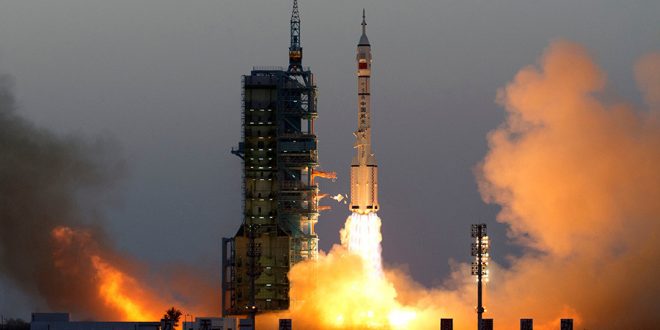Two Chinese astronauts took off on a project to develop the ability to explore space. The Shenzhou 11 spacecraft blasted off from the Jiuquan satellite launch center. The astronauts were Chen 38, and Jing, 50.
The Shenzhou-11 spacecraft, carried on the back of a Long March-2F rocket, blasted off from the Jiuquan Satellite Launch Center in the Gobi desert just after 7:30 a.m. local time on Monday. It entered its designated orbit a short time later without any sign of trouble.
Two astronauts are on board the spacecraft and will dock with Tiangong-2, which means “Heavenly Palace 2” and was launched just last month. The crew is expected to stay on board for about a month, making it China’s longest-ever space mission.
Tiangong-2 is China’s second step towards an independent space station and is capable of receiving both manned and unmanned spacecraft, but the main purpose of the space lab is to test its systems and processes for mid-term space stays and refueling.
The space lab underwent several weeks of testing before the go-ahead was given for Monday’s launch. In addition to testing the lab’s systems, the astronauts will also carry out a number of scientific experiments.
The space lab replaces the Tiangong-1 space station prototype, which launched in September 2011 but retired from service earlier this year. China hopes to launch the core module for its permanent space station in 2018, followed by the first laboratory module in 2020 and the second one in 2022.
Tiangong-2 has the capacity to support a crew of two for 30 days, but the permanent station will be equipped to support three astronauts – or taikonauts as they are called in China – for about 40 days.
China is banned from using the International Space Station (ISS) as a result of opposition from the United States, and the exclusion was set in stone in 2011 when the U.S. Congress passed a law that bans scientific collaboration with China over alleged espionage risks.
Agencies/Canadajournal
 Canada Journal – News of the World Articles and videos to bring you the biggest Canadian news stories from across the country every day
Canada Journal – News of the World Articles and videos to bring you the biggest Canadian news stories from across the country every day



